Cysteine stone - Study guides, Class notes & Summaries
Looking for the best study guides, study notes and summaries about Cysteine stone? On this page you'll find 55 study documents about Cysteine stone.
All 55 results
Sort by
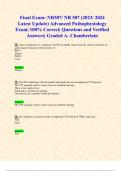 Popular
Popular
-
Final Exam: NR507/ NR 507 (2023/ 2024 Latest Update) Advanced Pathophysiology Exam| 100% Correct| Questions and Verified Answers| Graded A- Chamberlain
- Exam (elaborations) • 39 pages • 2023
- Available in package deal
-
- $11.99
- 1x sold
- + learn more
Final Exam: NR507/ NR 507 (2023/ 2024 Latest Update) Advanced Pathophysiology Exam| 100% Correct| Questions and Verified Answers| Graded A- Chamberlain Q: Upon examination of a urinalysis, the NP can highly suspect that the causative bacteria are gram negative because of the presence of: RBCs. Nitrites. WBCs. Casts. Answer: Nitrites. Q: The NP would know that the patient most likely has an uncomplicated UTI because: The UTI responds well to a short course of antibiotic thera...
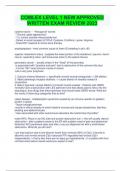
-
COMLEX LEVEL 1 NEW APPROVED WRITTEN EXAM REVIEW 2023
- Exam (elaborations) • 39 pages • 2023
-
- $8.49
- 1x sold
- + learn more
COMLEX LEVEL 1 NEW APPROVED WRITTEN EXAM REVIEW 2023 cysteine stone - - *Hexagonal* stones - *Ground, glass appearance* - *(+) urinary cyanide nitroprusside test - Defect in renal transport of COLA: Cysteine, Ornithine, Lysine, Arginine - Does NOT respond to shock wave therapy angiodysplasia - most common cause of lower GI bleeding in pt's >60 superior mesenteric artery - supplies the lower portion of the duodenum, jejunum, ileum, cecum, ascending colon, and transverse colon to ...
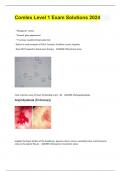
-
Comlex Level 1 Exam Solutions 2024
- Exam (elaborations) • 55 pages • 2024
-
- $14.49
- + learn more
Comlex Level 1 Exam Solutions 2024 - *Hexagonal* stones - *Ground, glass appearance* - *(+) urinary cyanide nitroprusside test - Defect in renal transport of COLA: Cysteine, Ornithine, Lysine, Arginine - Does NOT respond to shock wave therapy - ANSWER ☑☑cysteine stone most common cause of lower GI bleeding in pt's >60 - ANSWER ☑☑angiodysplasia
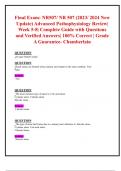
-
Final Exam: NR507/ NR 507 (2023/ 2024 New Update) Advanced Pathophysiology Review| Week 5-8| Complete Guide with Questions and Verified Answers| 100% Correct | Grade A Guarantee- Chamberlain
- Exam (elaborations) • 114 pages • 2023
- Available in package deal
-
- $12.49
- + learn more
Final Exam: NR507/ NR 507 (2023/ 2024 New Update) Advanced Pathophysiology Review| Week 5-8| Complete Guide with Questions and Verified Answers| 100% Correct | Grade A Guarantee- Chamberlain QUESTION pre-quiz Renal Calculi n QUESTION Renal stones are formed when calcium and oxalate in the urine combine. True False Answer: True QUESTION The most common type of stone is: Uric acid stone. Cysteine stone. Calcium stone. Struvite stone. Answer: Calcium ston...
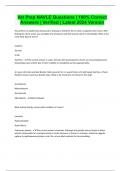
-
Vet Prep NAVLE Questions | 100% Correct Answers | Verified | Latest 2024 Version
- Exam (elaborations) • 109 pages • 2024
- Available in package deal
-
- $15.49
- + learn more
You perform an abdominal ultrasound to evaluate a Yorkshire Terrier with a suspected liver shunt. After finding the shunt vessel, you complete the ultrasound and find several calculi in the bladder. What is the most likely type of stone? Cysteine Struvite Urate Xanthine - The correct answer is urate. Animals with portosystemic shunts are very predisposed to developing urate uroliths due to their inability to metabolize purines appropriately. A 2-year old male castrated Border Collie pres...
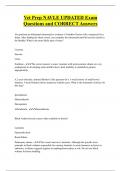
-
Vet Prep NAVLE UPDATED Exam Questions and CORRECT Answers
- Exam (elaborations) • 109 pages • 2024
-
- $10.99
- + learn more
You perform an abdominal ultrasound to evaluate a Yorkshire Terrier with a suspected liver shunt. After finding the shunt vessel, you complete the ultrasound and find several calculi in the bladder. What is the most likely type of stone? Cysteine Struvite Urate Xanthine - The correct answer is urate. Animals with portosystemic shunts are very predisposed to developing urate uroliths due to their inability to metabolize purines appropriately. A 2-year old male castrated Border Collie...
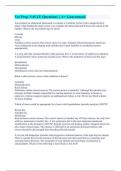
-
Vet Prep NAVLE Questions || A+ Guaranteed.
- Exam (elaborations) • 86 pages • 2024
- Available in package deal
-
- $17.29
- + learn more
You perform an abdominal ultrasound to evaluate a Yorkshire Terrier with a suspected liver shunt. After finding the shunt vessel, you complete the ultrasound and find several calculi in the bladder. What is the most likely type of stone? Cysteine Struvite Urate Xanthine correct answers The correct answer is urate. Animals with portosystemic shunts are very predisposed to developing urate uroliths due to their inability to metabolize purines appropriately. A 2-year old male castrated Bor...

-
Vet Prep NAVLE /244 Questions with Complete Solutions
- Exam (elaborations) • 112 pages • 2023
- Available in package deal
-
- $12.99
- + learn more
Vet Prep NAVLE /244 Questions with Complete Solutions Quiz :You perform an abdominal ultrasound to evaluate a Yorkshire Terrier with a suspected liver shunt. After finding the shunt vessel, you complete the ultrasound and find several calculi in the bladder. What is the most likely type of stone? Cysteine Struvite Urate Xanthine

-
NURSING 112023 basic adult health Final Exam Review- Keiser University
- Summary • 71 pages • 2023
-
- $11.49
- + learn more
Final Review RENAL CALCULI The gold standard for diagnosing a renal stone is CT scan. Renal calculi can be found in the ureter or bladder. Stones form when calcium and oxalate in the urine combine. Calcium stones are the most commonly formed stones. Struvite stones commonly result from a UTI. Normally, there should not be stone formation in the urine. Our urine actually has inhibitors to prevent stone formation. These include citrate and magnesium. Urine cont...
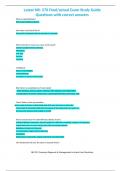
-
Latest NR- 570 Final/actual Exam Study Guide Questions with correct answers
- Exam (elaborations) • 27 pages • 2024
-
- $11.49
- + learn more
What is nephrolithiasis? Renal calculi (kidney stones) How does renal calculi form? Formed d/t elevated levels of minerals in the body What minerals in excess can cause renal calculi? Calcium oxalate (most common), Phosphate Uric acid Struvite Cysteine Urolithiasis Stone in the bladder Ureterolithiasis Condition of stones in the ureter Risk Factor & complications of renal calculi -Male, 20-50yo, previous stones, obesity, HTN, diabetes, low fluid intake. -compl...

Do you wonder why so many students wear nice clothes, have money to spare and enjoy tons of free time? Well, they sell on Stuvia! Imagine your study notes being downloaded a dozen times for $15 each. Every. Single. Day. Discover all about earning on Stuvia


